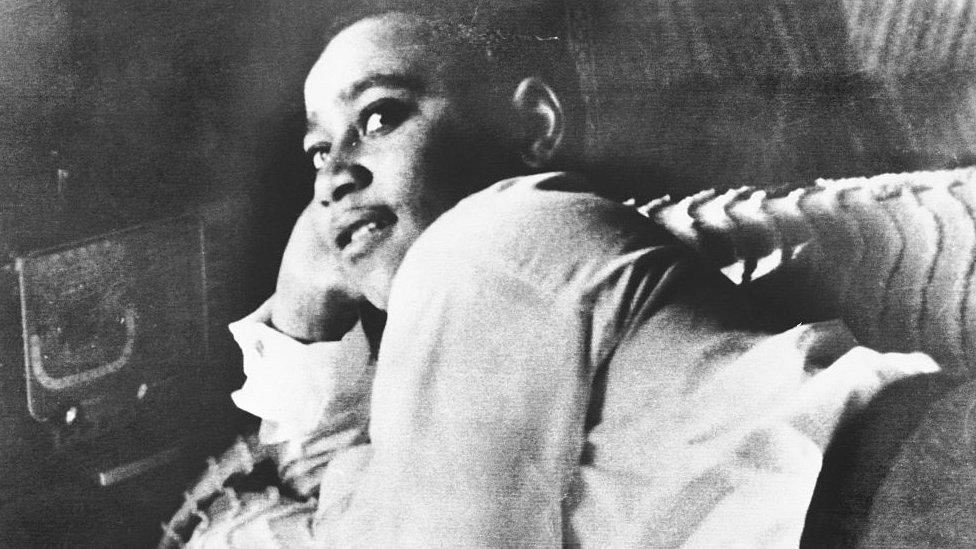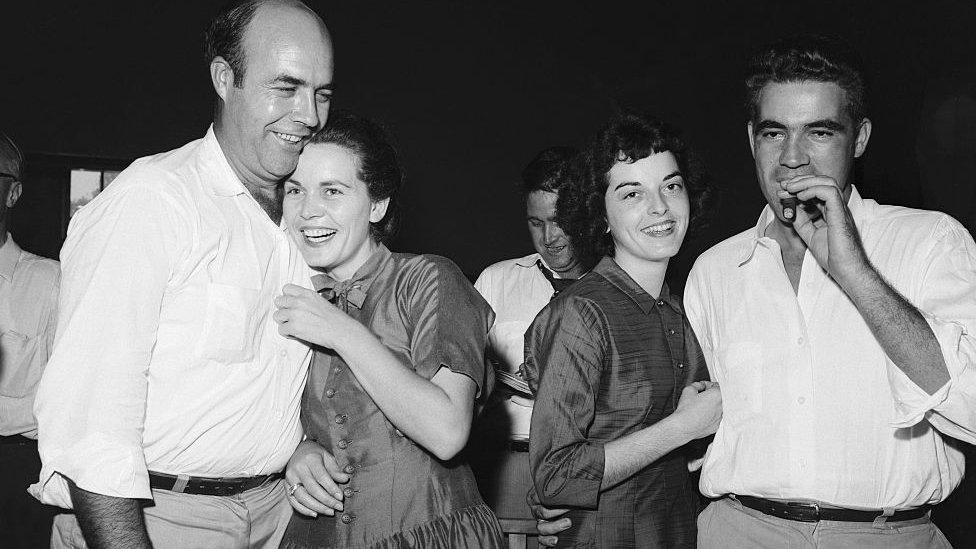Emmett Till: US closes investigation without charges
- Published

Emmett Till had been visiting family in Mississippi when he was brutally killed
The US government has closed an inquiry into the infamous 1955 murder of a black boy in Mississippi after failing to corroborate an author's claim that a key figure in the case lied.
The Department of Justice (DoJ) made the announcement after meeting Emmett Till's relatives in Illinois on Monday.
The Chicago 14-year-old was kidnapped, tortured and killed after a white woman said he had harassed her at a store.
His death galvanised America's then-budding civil rights movement.
Emmett's mother insisted on an open coffin at the funeral, and the published photos of the boy's brutalised remains shocked the nation.
The DoJ reopened the case in 2018 after a book cast doubt on the testimony of a white woman who was central to the case.
Carolyn Bryant Donham said Emmett had grabbed her by the waist, uttered a profanity and asked her for a date while she was alone in the family grocery store on the evening of 24 August 1955 in Money, Mississippi.
But a 2017 best-selling book, The Blood of Emmett Till, by historian Timothy Tyson, quoted her as recanting this story.
The author said she had indicated - in her first ever known interview - that her courtroom testimony six decades earlier about Emmett's purported sexual advance was unfounded.
However, the DoJ said in a statement on Monday, external that the FBI had interviewed Ms Donham, and she had denied ever disavowing her testimony, and did not provide any further information.
They added that authorities concluded there was "insufficient evidence to prove that she ever told the professor [Mr Tyson] that any part of her testimony was untrue".
"Although the professor represented that he had recorded two interviews with her, he provided the FBI with only one recording, which did not contain any recantation."
The statement added: "The professor also provided inconsistent explanations about whether the missing recording included the alleged recantation or whether, instead, the woman made the key admission before he began recording the interview."
Officials also said there was nothing to validate the claim that Ms Donham had disavowed her story in any transcript of Mr Tyson's interviews.
The author quotes Ms Donham in the book as saying: "That part's not true. Nothing that boy did could ever justify what happened to him."

Roy and Carolyn Bryant (left) and J W Milam and his wife (right) after the two men were acquitted by an all white, male jury
But the DoJ said even in the author's account it was unclear what Ms Donham was referring to when she was quoted as saying "that part's not true".
Ms Donham's daughter-in-law, Marsha Holley Bryant, was present for the two tape-recorded interviews with Mr Tyson, and she said in 2018 that Ms Donham had never recanted.
Mr Tyson, a researcher and historian at Duke University in North Carolina, stood by his version in statements to US media on Monday.
He said in an email to the New York Times, external: "Carolyn started spilling the beans before I got the recorder going. I documented her words carefully."
He added: "My reporting is rock solid."
He said in an email to NBC News, external: "I am standing in the public square telling the truth as I see it based on solid evidence."


Emmett's cousin Simeon Wright was among eyewitnesses, external who said Emmett had wolf-whistled at Ms Donham outside the store for a laugh, but Mr Wright denied that Emmett had ever spoken out of turn to her.
Four days later, Emmett was dragged from his bed at his uncle's home, beaten and shot in the head. His corpse would be recovered from a local river.
Ms Donham's ex-husband, Roy Bryant, and brother-in-law, JW Milam, were prosecuted for Emmett's death. They were acquitted by an all-white jury after just over an hour of deliberation.
Months later, they confessed to the murder in a paid magazine interview, but maintained they had done nothing wrong.
The pair were not brought to trial again, and have since died.
You may also be interested in:
Her ancestors enslaved mine. Now we're friends